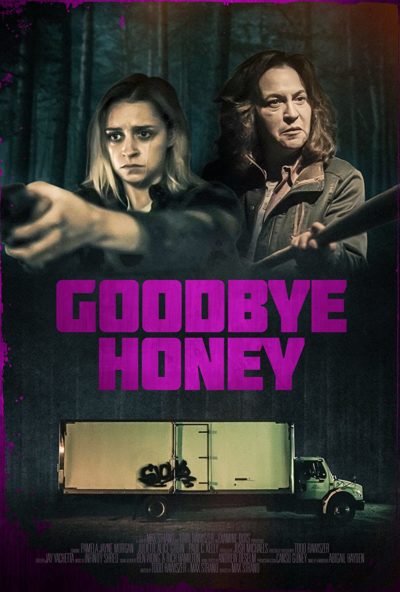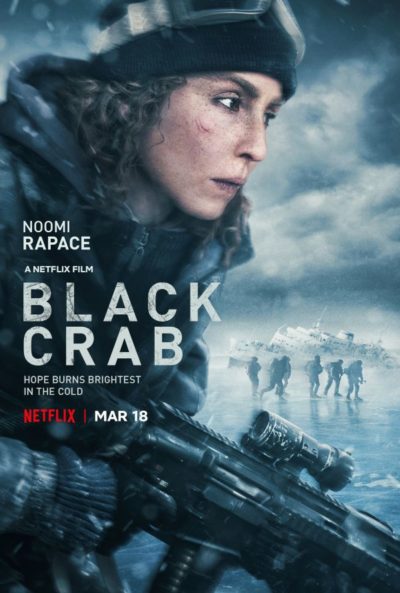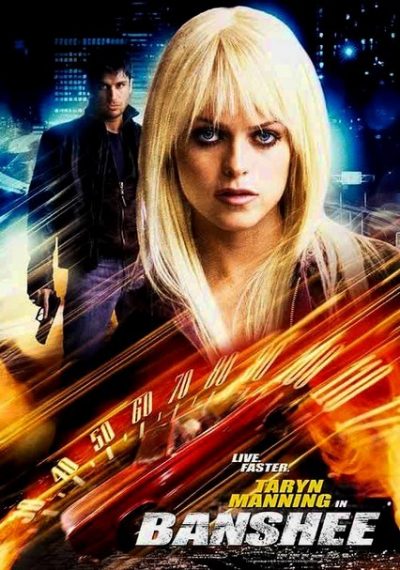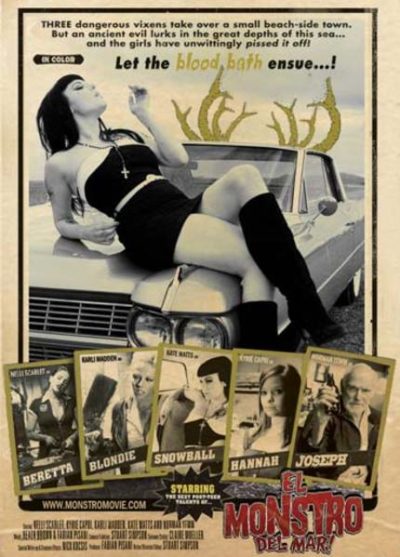★½
“Motion without emotion. “
 It probably didn’t help that I watched this the same day as I finished off the slick, well-animated and occasionally downright beautiful Arcane. This is… not any of those. Well, that’s a bit unfair. The artwork in this “motion comic” is actually not bad (the cover, right, is certainly striking, if not exactly representative!). But being taken off the printed page diminishes the impact considerably, especially when combined with some genuinely terrible voice acting. The setting here is… let’s be honest, it’s Johnny Mnemonic, a good cyberpunk novel by William Gibson that became a not-so-good Keanu Reeves movie. In both worlds, data is now transferred in the heads of human couriers, this being deemed safer than online methods which are vulnerable to hackers. Megan is one such courier, capable of defending her cargo with extreme prejudice.
It probably didn’t help that I watched this the same day as I finished off the slick, well-animated and occasionally downright beautiful Arcane. This is… not any of those. Well, that’s a bit unfair. The artwork in this “motion comic” is actually not bad (the cover, right, is certainly striking, if not exactly representative!). But being taken off the printed page diminishes the impact considerably, especially when combined with some genuinely terrible voice acting. The setting here is… let’s be honest, it’s Johnny Mnemonic, a good cyberpunk novel by William Gibson that became a not-so-good Keanu Reeves movie. In both worlds, data is now transferred in the heads of human couriers, this being deemed safer than online methods which are vulnerable to hackers. Megan is one such courier, capable of defending her cargo with extreme prejudice.
Except, it turns out there’s considerably more to her past than even she knows, as becomes clear after a client tries to assassinate her. Thereafter, things get increasingly complex, with a host of friends, enemies, enemies pretending to be friends, and a slew of Alphas, which are clones based on the DNA of Meg, a.k.a. Omega. It’s all a) rather confusing, and b) not very interesting. Though it’s a bit of a vicious cycle. b) triggers an attention deficit, which acts as a force multiplier on a), then this feeds back into b). I actually did give up about two-thirds of the way through. But much like Battered, the short running time (53 mins here) was its saving grace. Realizing there were barely 15 mins left, I put it back on. Though I will not be taking questions on plot developments in that final section.
The structure here is also off-putting, with the story separated into episodes, no longer than five minutes, which interrupts the flow in an annoying and pointless fashion. Just tell the damn story. But my biggest gripe was the voices, though Andrei as Omega isn’t the problem. It’s a supporting cast who could, almost universally, be replaced by a speech-to-text program, with positive results. And that’s not even mentioning the bad, fake foreign accents, e.g. Russian (or maybe it was French. Hard to tell) and Spanish. Considering there’s not even lip-synching to consider, in this unanimated format, it’s a poor effort indeed.
Maybe it’s just me. Perhaps I need to watch one of these every few years, to be reminded of how crappy the motion comic concept is. For on the basis of this, it seems to combine the worst elements of both comic books and animation. However, it may not be fair to judge the whole medium, on the basis of what seems a badly executed example. There were a couple of moments where the conversion process was reasonabe, and the effect of the comic panels came through as adequately realized. But overall, this was a poor excuse for entertainment. The “To be continued” caption at the end, seemed more like a threat than a promise.
Dir: Mark Edward Lewis
Star (voice): Alina Andrei, Mark Edward Lewis, Jan Shiva, Teresa Noreen






 There is a good concept here. Unfortunately, rarely have I seen an idea so conspicuously derailed by dreadful execution. Let’s not get ahead of ourselves though, and begin by focusing on the positives here. Dawn (Morgan) is a truck driver who is on a cross-country route, and pulls off the road into a remote, wooded location for an obligatory rest stop. Barely has she come to a halt, when a terrified young woman, Phoebe (Gobin), shows up outside her cab, demanding help. She claims to have been abducted, and been held nearby. But she managed to escape from her kidnapper, who is now hot on her heels, with evil intentions. However, is the new arrival speaking the truth or is she dangerously deranged?
There is a good concept here. Unfortunately, rarely have I seen an idea so conspicuously derailed by dreadful execution. Let’s not get ahead of ourselves though, and begin by focusing on the positives here. Dawn (Morgan) is a truck driver who is on a cross-country route, and pulls off the road into a remote, wooded location for an obligatory rest stop. Barely has she come to a halt, when a terrified young woman, Phoebe (Gobin), shows up outside her cab, demanding help. She claims to have been abducted, and been held nearby. But she managed to escape from her kidnapper, who is now hot on her heels, with evil intentions. However, is the new arrival speaking the truth or is she dangerously deranged?
 This was a very pleasant surprise. I wasn’t expecting much from this, especially after seeing Wynorski’s name – let’s be honest, he is best known for bargain basement soft-port. That said, he does occasionally hit one out of the park, such as the sublime Deathstalker II. This is definitely one of his better entries, even if it is, by and large, a low-budget version of Assault on Precinct 13.
This was a very pleasant surprise. I wasn’t expecting much from this, especially after seeing Wynorski’s name – let’s be honest, he is best known for bargain basement soft-port. That said, he does occasionally hit one out of the park, such as the sublime Deathstalker II. This is definitely one of his better entries, even if it is, by and large, a low-budget version of Assault on Precinct 13. This probably falls into the category of lightly amusing, rather than anything more. But I can’t say I was ever bored, and it’s assembled well enough technically that I can’t complain. The heroine is Mi-Young (Uhm), a former North Korean agent, who defected, changed her looks through plastic surgery, and now lives a quiet existence, with a part-time job selling pastries in the local market. She’s married to Seok-Hwan (Park), a computer repairman, and their life is frugal as far as wealth goes. Seok-Hwan, however, is wins a promotion run by a soft-drink company, getting them and their young daughter a trip to Hawaii.
This probably falls into the category of lightly amusing, rather than anything more. But I can’t say I was ever bored, and it’s assembled well enough technically that I can’t complain. The heroine is Mi-Young (Uhm), a former North Korean agent, who defected, changed her looks through plastic surgery, and now lives a quiet existence, with a part-time job selling pastries in the local market. She’s married to Seok-Hwan (Park), a computer repairman, and their life is frugal as far as wealth goes. Seok-Hwan, however, is wins a promotion run by a soft-drink company, getting them and their young daughter a trip to Hawaii. Rapace seems to be turning into a female version of Ryan Reynolds. By which I mean, it seems that hardly a month goes past without a new Netflix Original coming out starring her. Ryan had 6 Underground, Red Notice and The Adam Project. Noomi has given us
Rapace seems to be turning into a female version of Ryan Reynolds. By which I mean, it seems that hardly a month goes past without a new Netflix Original coming out starring her. Ryan had 6 Underground, Red Notice and The Adam Project. Noomi has given us  I must confess I have not seen Confessions of a Homicidal Prostitute, to which this is a sequel. It’s marginally possible, I suppose, that the character development, story and nuance were present there, and explain why these are all but entirely absent in its successor. I would not, however, be prepared to bet on it. I suspect the original was every bit as mean-spirited as this: and “suspect” is all I’ll ever do, because I won’t be making any effort to track it down. In fact, I probably wouldn’t watch it if my aged mother begged me to on her death-bed. Too harsh? Perhaps. Yet I don’t think I’ve ever seen a flat-out
I must confess I have not seen Confessions of a Homicidal Prostitute, to which this is a sequel. It’s marginally possible, I suppose, that the character development, story and nuance were present there, and explain why these are all but entirely absent in its successor. I would not, however, be prepared to bet on it. I suspect the original was every bit as mean-spirited as this: and “suspect” is all I’ll ever do, because I won’t be making any effort to track it down. In fact, I probably wouldn’t watch it if my aged mother begged me to on her death-bed. Too harsh? Perhaps. Yet I don’t think I’ve ever seen a flat-out  This one is slightly unusual among action-heroine films, in that it was both written and directed by women: Kirsten Elms and Kari Skogland respectively. Unfortunately, it’s not exactly an advert for their gender; after a brisk start, it falls apart, and becomes a ridiculously implausible movie, in a completely different genre from where it started. That’s a real pity, because where it started, had a lot more potential than where it ends up. It begins with Sage Rion (Manning), a young but highly-talented thief, taking a bet with her partner, as to who can boost a classic car quickest. She picks a 1966 Dodge Challenger, but inadvertently leaves her ID at the scene of the crime.
This one is slightly unusual among action-heroine films, in that it was both written and directed by women: Kirsten Elms and Kari Skogland respectively. Unfortunately, it’s not exactly an advert for their gender; after a brisk start, it falls apart, and becomes a ridiculously implausible movie, in a completely different genre from where it started. That’s a real pity, because where it started, had a lot more potential than where it ends up. It begins with Sage Rion (Manning), a young but highly-talented thief, taking a bet with her partner, as to who can boost a classic car quickest. She picks a 1966 Dodge Challenger, but inadvertently leaves her ID at the scene of the crime. This is certainly an odd animal. It takes place in and around a Thailand hospital, where one of the physicians, Dr. Tar (Jarujinda), has a lucrative side-scam in selling bodies to… well, if it’s not clear who, there appears to be sufficient demand for them. He is in cahoots with a group of seven nurses, but one of them, his girlfriend Tahwaan (Wachananont), finds out he is having an affair with her sister, Nook (Rujiphan). After she threatens to go to the police, Dr. Tar and the other six nurses kidnap and kill Tahwaan. However, her spirit comes back from the grave, to take brutal vengeance on those responsible for her death. Naturally, the peeved ghost starts with the characters who bore relatively minor culpability, working her way up to Nook and the not-so-good doctor.
This is certainly an odd animal. It takes place in and around a Thailand hospital, where one of the physicians, Dr. Tar (Jarujinda), has a lucrative side-scam in selling bodies to… well, if it’s not clear who, there appears to be sufficient demand for them. He is in cahoots with a group of seven nurses, but one of them, his girlfriend Tahwaan (Wachananont), finds out he is having an affair with her sister, Nook (Rujiphan). After she threatens to go to the police, Dr. Tar and the other six nurses kidnap and kill Tahwaan. However, her spirit comes back from the grave, to take brutal vengeance on those responsible for her death. Naturally, the peeved ghost starts with the characters who bore relatively minor culpability, working her way up to Nook and the not-so-good doctor. I could have sworn I’ve seen this before, but a search of the reviews suggest otherwise! This is an Australian pastiche of a couple of different things. Perhaps the most obvious influence is
I could have sworn I’ve seen this before, but a search of the reviews suggest otherwise! This is an Australian pastiche of a couple of different things. Perhaps the most obvious influence is